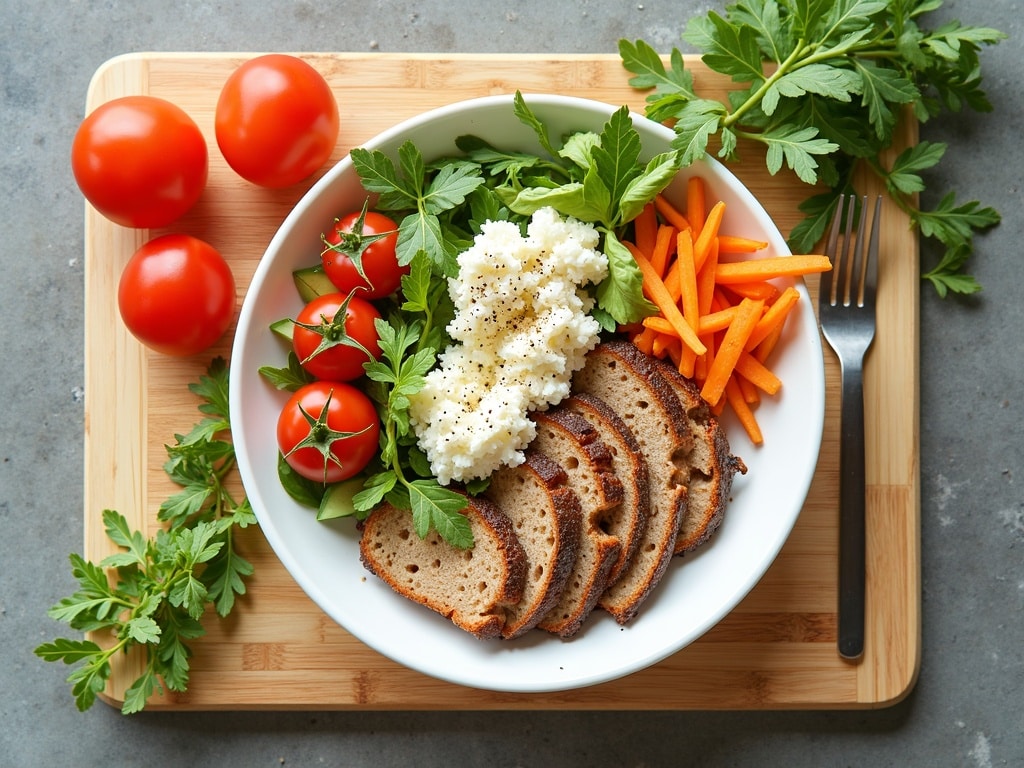What to Eat to Speed Up Your Metabolism: A Comprehensive Guide
Ever wish you could rev up your internal engine and burn calories more efficiently? The secret might just be in what you eat. Your metabolism, the complex process by which your body converts food and drink into energy, isn't solely determined by genetics. While some factors are indeed predetermined, you have significant control over boosting your metabolic rate through strategic food choices. So, ditch the fad diets and embrace a delicious, sustainable approach to a faster metabolism. This guide dives into the science-backed foods and eating habits that can help you unlock your body's fat-burning potential.
Understanding Metabolism: The Basics
Before we dive into the specific foods, let's clarify what we mean by metabolism. It's more than just how quickly you lose or gain weight. Metabolism encompasses all the chemical processes that occur in your body to keep you alive and functioning. These processes include:
- Basal Metabolic Rate (BMR): The number of calories your body burns at rest to maintain basic functions like breathing, circulation, and cell production.
- Thermic Effect of Food (TEF): The energy your body uses to digest, absorb, and process the nutrients from your meals.
- Physical Activity: The calories burned during any form of movement, from walking to intense workouts.
While you can't drastically alter your BMR overnight, you can influence the TEF and the calories burned through physical activity, both of which are directly impacted by your dietary choices.
The Powerhouse Foods for a Metabolism Boost
Certain foods possess unique properties that can naturally elevate your metabolism. Incorporating these into your diet can lead to increased calorie expenditure and improved overall health.
Protein: The Metabolic Workhorse
Protein is arguably the most crucial macronutrient for boosting metabolism. Why? Because it has a high thermic effect of food (TEF). Your body burns more calories digesting protein than it does digesting carbohydrates or fats. Aim to include a source of protein in every meal. Good sources include:
- Lean Meats: Chicken breast, turkey, lean beef
- Fish: Salmon, tuna, cod (rich in omega-3 fatty acids too!)
- Eggs: A complete protein source
- Legumes: Lentils, chickpeas, beans
- Greek Yogurt: High in protein and probiotics
- Tofu and Tempeh: Plant-based protein options
A study published in the American Journal of Clinical Nutrition found that increasing protein intake to 30% of total calories can significantly boost metabolism and reduce overall calorie intake.
Spice It Up: Chili Peppers and Metabolism
If you enjoy a bit of heat, you're in luck! Chili peppers contain capsaicin, a compound that can increase metabolism and promote fat burning. Capsaicin activates brown fat, a type of fat tissue that burns calories rather than storing them. Studies have shown that capsaicin can also reduce appetite. Consider adding chili peppers, cayenne pepper, or hot sauce to your meals – cautiously, of course, depending on your tolerance.
Green Tea: A Metabolism-Boosting Beverage
Green tea is packed with antioxidants and compounds that can benefit your metabolism. Catechins, specifically epigallocatechin gallate (EGCG), have been shown to increase fat oxidation and boost energy expenditure. A review of studies published in the International Journal of Obesity concluded that green tea extract can have a small but significant impact on weight management. Enjoy a cup or two of unsweetened green tea daily to reap its benefits.
Coffee: More Than Just a Wake-Up Call
Coffee's caffeine content provides a temporary metabolic boost. Caffeine stimulates the nervous system, which increases heart rate and energy expenditure. It can also improve focus and physical performance, allowing you to push harder during workouts. However, moderation is key; excessive caffeine consumption can lead to negative side effects like anxiety and insomnia. Stick to 1-3 cups of coffee per day.
Water: The Essential Metabolic Catalyst
Staying properly hydrated is crucial for overall health, including metabolic function. Water is involved in virtually every bodily process, including energy production. Studies have shown that drinking water can temporarily increase your resting metabolic rate. A study published in the Journal of Clinical Endocrinology & Metabolism found that drinking 500 ml of water increased metabolic rate by 30% for about an hour. Aim to drink at least eight glasses of water a day, and increase your intake during exercise or in hot weather.
Whole Grains: Fuel for Sustained Energy
While refined grains can lead to blood sugar spikes and crashes, whole grains provide a sustained release of energy. They are also rich in fiber, which promotes satiety and helps regulate blood sugar levels. Good choices include:
- Oats: Rich in soluble fiber
- Quinoa: A complete protein source
- Brown Rice: A good source of manganese
- Whole Wheat Bread: Choose varieties with minimal added sugar

Beyond Specific Foods: Optimizing Your Eating Habits
What you eat is important, but how you eat can also significantly impact your metabolism.
Eat Breakfast: Jumpstart Your Engine
Skipping breakfast can actually hinder your metabolism. When you wake up, your body has been fasting all night. Eating breakfast helps replenish your energy stores and kickstarts your metabolism for the day. Choose a breakfast that includes protein, healthy fats, and complex carbohydrates.
Small, Frequent Meals: Keeping the Fire Burning
Instead of eating three large meals a day, consider eating smaller, more frequent meals or snacks every 3-4 hours. This can help keep your metabolism elevated throughout the day and prevent drastic blood sugar fluctuations. This doesn't mean endless snacking, though! Opt for nutrient-dense snacks like fruits, vegetables, nuts, or yogurt.
Don't Skimp on Calories: Starvation Mode is a Myth
Severely restricting calories can backfire. When you drastically reduce your calorie intake, your body goes into survival mode and slows down your metabolism to conserve energy. This can make it harder to lose weight and even lead to muscle loss. Focus on creating a moderate calorie deficit through a combination of healthy eating and exercise.
Get Enough Sleep: Crucial for Metabolic Health
Sleep deprivation can disrupt hormones that regulate appetite and metabolism. Lack of sleep can increase levels of ghrelin, the hunger hormone, and decrease levels of leptin, the satiety hormone. Aim for 7-9 hours of quality sleep each night to support a healthy metabolism.
Incorporate Strength Training: Build Metabolic Muscle
Muscle tissue burns more calories at rest than fat tissue. Including strength training in your fitness routine can help you build muscle mass and increase your resting metabolic rate. Aim for at least two strength training sessions per week, targeting all major muscle groups. Even bodyweight exercises like squats, push-ups, and lunges can be effective.
Foods to Limit for a Healthy Metabolism
While focusing on metabolism-boosting foods is important, it's also crucial to limit your intake of foods that can hinder your metabolic rate and overall health.
- Processed Foods: Often high in sugar, unhealthy fats, and sodium, these foods offer little nutritional value and can contribute to weight gain and metabolic dysfunction.
- Sugary Drinks: Soda, juice, and sweetened beverages are loaded with empty calories and can lead to insulin resistance and weight gain.
- Refined Carbohydrates: White bread, pasta, and pastries are quickly digested, causing blood sugar spikes and crashes, which can negatively impact metabolism.
- Excessive Alcohol: Alcohol can interfere with nutrient absorption and slow down metabolism. Enjoy in moderation, if at all.
Sample Meal Plan for Boosting Metabolism
Here's a sample one-day meal plan incorporating metabolism-boosting foods:
- Breakfast: Oatmeal with berries, nuts, and a scoop of protein powder
- Mid-Morning Snack: Greek yogurt with a sprinkle of cinnamon
- Lunch: Grilled chicken salad with mixed greens, vegetables, and a light vinaigrette
- Mid-Afternoon Snack: Apple slices with almond butter
- Dinner: Baked salmon with roasted vegetables and quinoa
Debunking Metabolism Myths
There are many misconceptions about metabolism. Let's clear up some of the most common myths:
- Myth: Metabolism is solely determined by genetics. Reality: While genetics play a role, lifestyle factors like diet and exercise have a significant impact.
- Myth: Eating late at night causes weight gain. Reality: It's not the timing of your meals but the total number of calories you consume that matters.
- Myth: You can drastically change your metabolism overnight. Reality: Boosting metabolism is a gradual process that requires consistent effort and healthy habits.
Conclusion: A Sustainable Approach to a Faster Metabolism
Boosting your metabolism isn't about quick fixes or restrictive diets. It's about adopting a sustainable lifestyle that incorporates nutrient-rich foods, regular physical activity, and healthy habits. By focusing on protein-rich foods, spicy ingredients, green tea, coffee, water, and whole grains, you can naturally elevate your metabolic rate and achieve your health goals. Remember to be patient, consistent, and listen to your body along the way. And consider complementing dietary changes with other healthy habits such as regular exercise as outlined in this article about .

